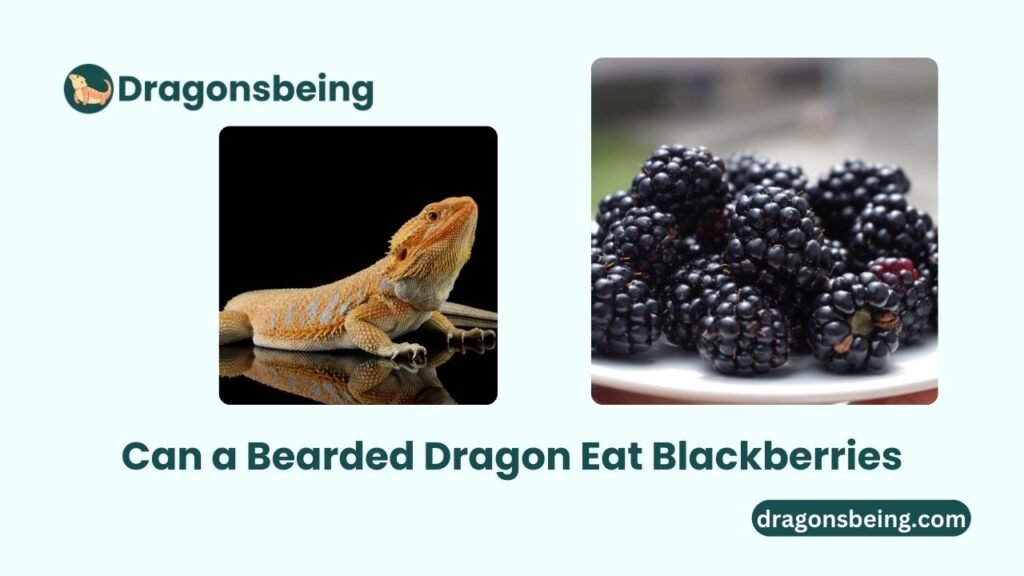Yes, bearded dragons can eat blackberries in moderation. These fruits provide essential vitamins and hydration.
Bearded dragons are popular pets known for their friendly demeanor and unique dietary needs. As omnivores, they thrive on a balanced diet of vegetables, fruits, and protein. Introducing fruits like blackberries can be a delightful treat for your dragon. Blackberries are rich in vitamins C and K, and they offer antioxidants that can support your pet’s health.
However, moderation is key. Too much fruit can lead to digestive issues due to high sugar content. Understanding the appropriate portion sizes and frequency is essential for ensuring your bearded dragon stays healthy and happy. Always wash fruits thoroughly before serving to remove pesticides and chemicals.
Introduction To Bearded Dragon Diet
Bearded dragons are popular pets. They have specific dietary needs. Understanding their diet helps keep them healthy. A proper diet includes protein, vegetables, and fruits.
Many owners wonder about feeding fruits like blackberries. Knowing what to feed your bearded dragon is crucial. It ensures they receive essential nutrients and thrive.
Essential Nutrients
Bearded dragons need a balanced diet. Their diet should include:
- Protein: Live insects like crickets and mealworms.
- Vegetables: Dark leafy greens such as collard greens or kale.
- Fruits: Safe fruits in moderation, like blackberries.
Each nutrient plays an important role:
| Nutrient | Role |
|---|---|
| Protein | Supports growth and energy. |
| Vitamins | Boosts immune system and overall health. |
| Minerals | Strengthens bones and organs. |
Common Dietary Mistakes
Many owners make mistakes in their bearded dragon’s diet. Avoid these common pitfalls:
- Feeding too much fruit.
- Relying only on insects.
- Neglecting leafy greens.
Too much fruit can lead to health issues. Always offer a mix of foods. Keep your dragon’s diet diverse. This keeps them happy and healthy.
The Appeal Of Blackberries
Blackberries are a popular fruit among humans. But can bearded dragons enjoy them too? These juicy berries offer more than just great taste. They also provide essential nutrients for your reptile friend.
Nutritional Value
Blackberries are packed with vitamins and minerals. They contain:
| Nutrient | Amount per 100g |
|---|---|
| Calories | 43 |
| Protein | 1.4g |
| Fat | 0.5g |
| Carbohydrates | 9.6g |
| Fiber | 5.3g |
| Vitamin C | 21mg |
These nutrients support your bearded dragon’s health. They help in digestion and boost the immune system.
Taste And Texture
Blackberries have a unique taste. They are sweet with a bit of tartness. This flavor can entice bearded dragons to try them.
The texture is also appealing. Blackberries are:
- Juicy
- Soft
- Fun to chew
This combination makes blackberries enjoyable for your pet. Their vibrant color adds visual appeal too.
Safe Fruits For Bearded Dragons
Bearded dragons can enjoy a variety of fruits. Fruits provide vitamins and hydration. Not all fruits are safe, though. It’s important to choose wisely.
Preferred Choices
- Blackberries – High in fiber and vitamins.
- Strawberries – Rich in Vitamin C.
- Mango – Contains Vitamin A.
- Blueberries – Packed with antioxidants.
- Peaches – Good for hydration.
These fruits are tasty and safe for your bearded dragon. Always wash fruits before feeding. Cut them into small pieces for easy eating.
Fruits To Avoid
| Fruit | Reason to Avoid |
|---|---|
| Avocado | Toxic to bearded dragons. |
| Citrus fruits | Can cause stomach upset. |
| Rhubarb | Highly toxic. |
| Grapes | May lead to kidney issues. |
| Bananas | High in sugar and low nutrients. |
Feeding safe fruits helps keep your bearded dragon healthy. Avoid harmful fruits to ensure their well-being. Always monitor your pet after introducing new foods.
Feeding Blackberries To Your Bearded Dragon
Bearded dragons can enjoy a variety of fruits, including blackberries. These berries provide essential vitamins and antioxidants. However, moderation is key. Too much fruit can upset their stomachs. Knowing how to prepare and serve blackberries is crucial for their health.
Preparation Tips
- Choose fresh, ripe blackberries.
- Wash the berries thoroughly to remove pesticides.
- Cut the berries into smaller pieces for easy eating.
- Serve blackberries as a treat, not a main meal.
- Mix blackberries with leafy greens for added nutrition.
Recommended Portions
Portion size depends on your bearded dragon’s age and size. Here’s a quick guide:
| Age | Recommended Portion |
|---|---|
| Juveniles | 1-2 small berries, 1-2 times a week |
| Adults | 2-3 small berries, 1-2 times a week |
Always observe your bearded dragon after introducing new foods. Watch for any signs of discomfort or allergies.
Benefits Of Blackberries In A Bearded Dragon’s Diet
Blackberries can be a tasty treat for your bearded dragon. These fruits offer various health benefits. They are packed with essential nutrients. Adding blackberries to their diet promotes overall wellness.
Vitamins And Minerals
Blackberries are rich in vital vitamins and minerals. Here’s a quick overview of their nutritional benefits:
| Nutrient | Benefit |
|---|---|
| Vitamin C | Boosts the immune system and helps fight infections. |
| Vitamin K | Supports bone health and aids in blood clotting. |
| Calcium | Essential for strong bones and teeth. |
| Potassium | Regulates fluid balance and muscle function. |
These nutrients contribute to your bearded dragon’s health. A balanced diet helps them thrive and grow.
Hydration And Fiber
Blackberries contain high water content. This keeps your bearded dragon hydrated. Proper hydration is crucial for digestion and overall health.
- Water Content: Supports hydration levels.
- Dietary Fiber: Aids in digestion and prevents constipation.
Fiber helps maintain a healthy gut. It supports regular bowel movements. Incorporating blackberries helps keep your bearded dragon happy.
Potential Risks And Considerations
Feeding your bearded dragon blackberries comes with some risks. Understanding these risks is important for your pet’s health. Here are key considerations.
Sugar Content Concerns
Blackberries contain natural sugars. Too much sugar can harm your bearded dragon.
- High sugar intake can lead to obesity.
- Obesity can cause other health problems.
- Monitor the amount of fruit given.
Limit blackberries to occasional treats. Always balance with other foods.
Pesticide Exposure
Pesticides on fruits pose a risk to your pet. Many fruits, including blackberries, may have chemicals.
| Risk | Description |
|---|---|
| Health Issues | Pesticides can cause digestive problems. |
| Allergic Reactions | Some dragons may react negatively. |
| Long-term Effects | Continuous exposure can lead to serious illness. |
Wash all fruits thoroughly before feeding. Consider organic options to reduce pesticide exposure.
Integrating Blackberries Into Their Diet
Blackberries can be a tasty treat for your bearded dragon. They provide essential vitamins and hydration. However, moderation is key. Understanding how to integrate blackberries into your pet’s diet is vital.
Frequency And Quantity
Feeding blackberries should be done wisely. Here are some guidelines:
| Age Group | Frequency | Quantity |
|---|---|---|
| Juvenile (0-6 months) | Once a week | 1-2 berries |
| Adult (6 months+) | Twice a month | 2-3 berries |
Too many blackberries can upset their stomach. Always monitor their reaction after feeding. Adjust the frequency and quantity based on their health.
Combining With Other Foods
Mixing blackberries with other foods can enhance nutrition. Here are some great combinations:
- Greens: Spinach, kale, or collard greens.
- Vegetables: Carrots, zucchini, or bell peppers.
- Proteins: Crickets or mealworms for added protein.
Chop blackberries into smaller pieces. This makes them easier to eat. Serve them alongside a variety of other foods. This approach keeps meals exciting and balanced.
Observing Your Bearded Dragon’s Health
Monitoring your bearded dragon’s health is crucial. Their diet directly affects their well-being. Blackberries can be a tasty treat, but they should be given in moderation. Watch for changes in behavior and physical signs.
Signs Of Positive Impact
- Increased Energy: A healthy bearded dragon is active. You may notice more movement and exploration.
- Shiny Skin: Bright, vibrant skin indicates good health. Blackberries can contribute to this glow.
- Healthy Appetite: A bearded dragon that enjoys blackberries may eat other foods well.
- Consistent Bowel Movements: Regular and normal droppings show good digestion.
Warning Signs To Watch Out For
Pay attention to any unusual changes. Here are some warning signs:
- Lethargy: If your dragon is less active, it may be a red flag.
- Loss of Appetite: Refusing food can indicate digestive issues.
- Diarrhea: Watery droppings can be a sign of trouble.
- Weight Loss: Noticeable weight loss can signal health problems.
| Positive Signs | Warning Signs |
|---|---|
| Increased Energy | Lethargy |
| Shiny Skin | Loss of Appetite |
| Healthy Appetite | Diarrhea |
| Consistent Bowel Movements | Weight Loss |
Regularly check for these signs. Quick action can prevent serious issues.
Frequently Asked Questions
Can Bearded Dragons Eat Blackberries Safely?
Yes, bearded dragons can safely eat blackberries in moderation. They provide vitamins but should not be the main diet.
How Often Can Bearded Dragons Eat Blackberries?
Blackberries should be offered occasionally, about once a week, to prevent digestive issues.
What Benefits Do Blackberries Offer Bearded Dragons?
Blackberries are rich in antioxidants, vitamins, and hydration, which support overall health and immune function.
Are There Any Risks Of Feeding Blackberries?
Feeding too many blackberries can lead to diarrhea due to their high sugar content. Moderation is key.
How Should Blackberries Be Prepared For Bearded Dragons?
Wash blackberries thoroughly and cut them into small pieces to prevent choking hazards.
Can Baby Bearded Dragons Eat Blackberries?
Baby bearded dragons can eat small amounts of blackberries, but prioritize insects and greens for their diet.
Conclusion
Bearded dragons can enjoy blackberries as an occasional treat. These fruits provide hydration and essential nutrients. Always ensure moderation to maintain your pet’s health. Monitor their reaction to new foods closely. A balanced diet is key for a happy, thriving bearded dragon.
Keep experimenting with safe options to enhance their meals.

Hi, I’m Dr. Michelle Mayers, a veterinary professional with a deep passion for animal health and well-being. Over the years, I’ve dedicated my life to caring for animals and helping pet owners better understand their furry, feathered, or scaly companions. On my blog, Dragonsbeing, I share insights, tips, and stories that aim to educate, inspire, and connect with fellow animal lovers. Join me at Dragonsbeing as we explore the fascinating world of veterinary care and celebrate the special bond between humans and animals!


